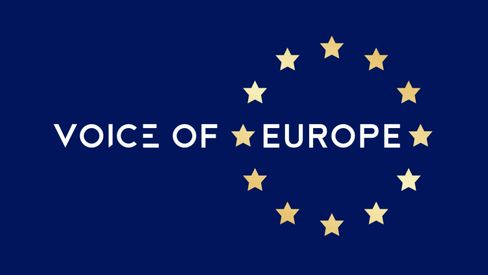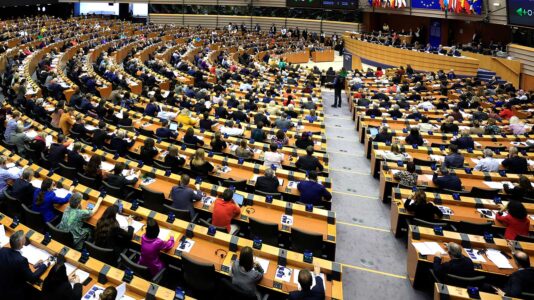Over the Easter break, the news broke that the Voice of Europe (VoE) publication was shut down, the bank accounts of its owners, Viktor Medvedchuk and Artem Marchevsky, were frozen, and the two men were hit with sanctions.
The story was major news and made headlines across Europe and will continue to have political implications well into the future, including relating to the upcoming EU parliament elections. Therefore, it is worth examining the claims being made about VoE.
For starters, Voice of Europe has been described as a media “influence” network working on behalf of Russia. For instance, the typical article featured the following text: “The Czech Republic announced on Wednesday that it had busted a Moscow-financed network that spread Russian propaganda and wielded influence across Europe, including in the European Parliament.”
This claim alone shows how the media puffs up a threat to scaremonger, because in the end, Voice of Europe had no real influence, despite the media claims echoed across Europe. For anyone who actually kept an eye on Voice of Europe, it was clear it was shadowbanned on Facebook and X. In other words, the website garnered nearly no hits whatsoever.
There is not a single media report that delves into Voice of Europe’s hits or views because this would have diminished the impact of the story. Western intelligence services taking out a website that only had 88,000 hits in all of January, according to SimilarWeb, does not sound very sexy. After all, many news sites get more hits a single day than VoE garnered in an entire month.
One German report notes that the Voice of Europe has 180,000 followers on X, but this is also misleading. Voice of Europe existed many years ago under different Western European owners. The site was extremely popular at one time, garnered millions of hits and grew a large social media following. However, it eventually went under after it was hit with shadowbans on the major social media networks. Remix News covered that development at the time.
Eventually, the Voice of Europe brand was sold to new owners, presumably Medvedchuk and Marchevsky, and they inherited all the followers under the old accounts. However, these followers most certainly came with some serious “catches,” namely that VoE was already shadowbanned and censored. The site could not leverage these followers to grow or reach a larger audience, as the numbers show.
Notably, this shadow ban appeared to remain in place under Elon Musk, as the VoE account barely gained any views or engagement through X despite having a very large following.
VoE suffered no doubt from its stance against immigration and its coverage of right-wing and conservative political parties. However, although the site interviewed some notable politicians on the right, that does not necessarily mean the site had influence. Many politicians from right-leaning parties are locked out of much of the media market in their own home countries, leaving them eager to take on interviews even at smaller news outlets, even if they do not wield much influence.
The role of the intelligence agencies
While the Czech intelligence service (BIS) was the face of the whole disclosure, there were likely other European and Western intelligence agencies involved. The intelligence services are all a black box in the end, so we will never know.
The methods they use to gather intelligence, as well as the claims they make about the intelligence, are often never verified nor transparent at any level. U.S. intelligence agencies, for instance, made claims that Russia was involved in influencing the 2016 election, a claim vocally amplified during Trump’s administration ad nauseam. There is little doubt that Russia made such attempts, but as a study from Nature showed, 1 percent of social media users saw 70 percent of all such impressions, and the researchers determined that the influence campaign had no impact on the election. Additionally, the Russian campaign did not shape the opinions of those seeing the content — as most of them were already Republican and already planned to vote for Donald Trump.
These claims about Voice of Europe appear to be once again making a mountain out of a molehill. As already noted, the site was simply not influential.
In addition, claims that a bevy of European politicians, including the Alternative for Germany’s (AfD) Petr Bystron took money from VoE should be taken, as of now, with a grain of salt. The Czech intelligence service currently claims it has actual recordings proving that Bystron took money from VoE but refuses to release them.
Bystron himself and the AfD executive board are calling for the audio recording to be released.
“We will not allow our election campaign to be dictated by manipulative accusations from foreign secret services,” said Bystron about the alleged recordings.
In an interview with Brussels Signal, AfD MEP Maximilian Krah, the lead candidate for the AfD in the EU parliament elections, stated that if Bystron truly took money from Russia, that would constitute a crime, and the authorities should simply arrest him. He notes that it is interesting that Bystron is not being charged and also called for the alleged audio recording to be released.
Krah, however, said that the AfD must be prepared for a scenario in which there could be a kernel of truth to the claims being made against Bystron.
In the end, the case of Bystron could result in criminal charges, perhaps shortly before the EU elections to maximize their impact; however, it is also very possible the audio recordings do not exist, or if they do, they are taken out of context. Politicized intelligence agencies can make such claims, feed them to the media, and smear their opponents with mere accusations. This is not a court of law, and they do not need to present any evidence that can be analyzed by the public or outside experts.
Krah notes that this all appears to be a political hit job designed to harm right-wing parties, which are surging in the polls, right before the EU parliamentary elections. Whatever the case, Western Intelligence agencies, working hand in hand with NGOs, appear to be spying on right-wing parties en masse and drip-feeding information in a coordinated campaign to take out their political rivals. The story by Correctiv, an NGO funded by the German government, targeting a meeting involving the AfD near Potsdam using sophisticated spying techniques, is a perfect example of this trend line.
Voice of Europe appeared simply to be their next target after the Correctiv story broke.
Remix News and Voice of Europe
On top of all of this, the same “mobbed up” NGOs and journalists, who are no doubt keyed into intelligence networks, or at the very least, third parties that operate with the intelligence networks, appear to have tried to drag Remix News into this whole “scandal.”
Remix News responded to the accusations on X in a thread.
The journalist in this case also claimed Remix News is run by the Hungarian government, which is simply not true.
It is worth noting again that Remix News, in the end, did not have very much contact with Voice of Europe at all, and in the two instances that we did, we messaged the outlet about content they had ripped from our site. It is unclear to Remix News how much content was taken from our pages and slapped onto Voice of Europe, as it is not a site our editorial staff frequented, although they did cover some of the same news topics we focus on. However, all the content VoE took from us was taken without our consent and certainly was not done in cooperation.
More concerning for us was the fact that Voice of Europe ripped an article from us word for word and passed it off as their own, even using the same photo from our site. For a site allegedly swimming in Russian money, it appears they could not afford journalists who could be bothered to even rewrite our content before putting it up on their site. To be fair, they responded and said it would not happen again, and indeed, perhaps some journalist tried to pull a fast one on their editorial team. However, something similar happened again, Remix News complained about it, and that was the end of our communication. In the end, what little relations that existed between Remix and VoE were not good.
If VoE truly received its funding from Russia, then it was no doubt a vulnerability. RT is already banned in Europe, and intelligence services are looking for any reason to target anything related to Russia for whatever reason, even news outlets. Regardless of the claims, the tactic of shutting down a news publisher in such a manner, even if it is running pro-Russian content, is suspect. If Voice of Europe conducted illegal activity, then we should see the specific charges in question. In general, shutting down news websites based on unsubstantiated claims from intelligence agencies is a recipe for more censorship in the future.
If European politicians did take money from Russia, we should also remember that hundreds of major Western businesses continue to take Russian money, with many German, French, and other European businesses continuing to operate directly in Russia. Where are the intelligence services knocking down their doors and arresting these CEOs? The Austrian government, along with other European governments, continues to buy Russian gas and oil. Many of these energy products are openly purchased or purchased through the backdoor through Indian middlemen.
In other words, this is all mostly a sham and faux outrage. The entire Hungarian left was funded by “foreign sponsors.” If Russia is truly the evil adversary the EU makes it out to be, Brussels should put its money where its mouth is and end business relations with Russia entirely.
It is notable that Remix News was dragged into this whole fiasco; however, It appears to be an effective tactic, as the journalist who spread this rumor received tens of thousands of hits, while our response barely received over a thousand impressions.
With our mere 12,000 followers, we simply do not have the reach, which might have to do with the fact that Remix News was entirely banned from Twitter for two years under the previous management. Regime-paid journalists do not have these issues.
At the very least, we can expect more of these dirty tactics before the EU elections in June. Voice of Europe may have been an easy target due to its alleged funding structure, but dissident journalists and opposition politicians, particularly those on the right, are being spied on by intelligence agencies and NGOs. In the case of the AfD, for instance, this is a public fact. The information gathered in these spy operations is being echoed through the most powerful media organizations in the West, and it is only going to get worse — far worse.






